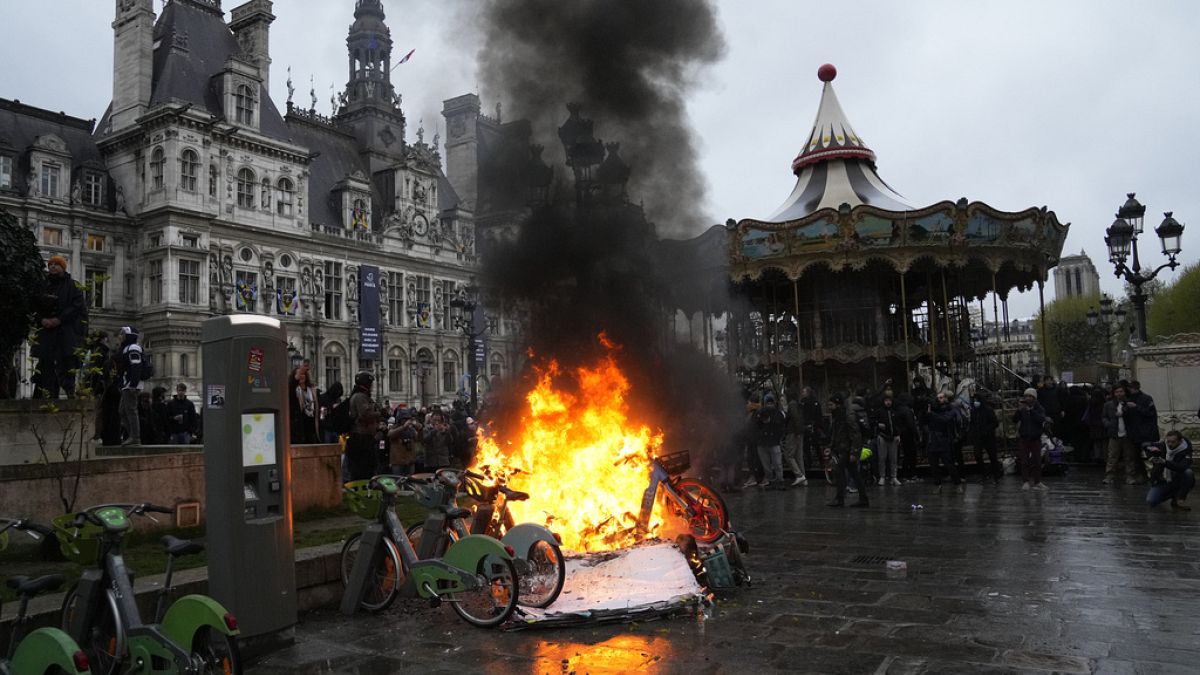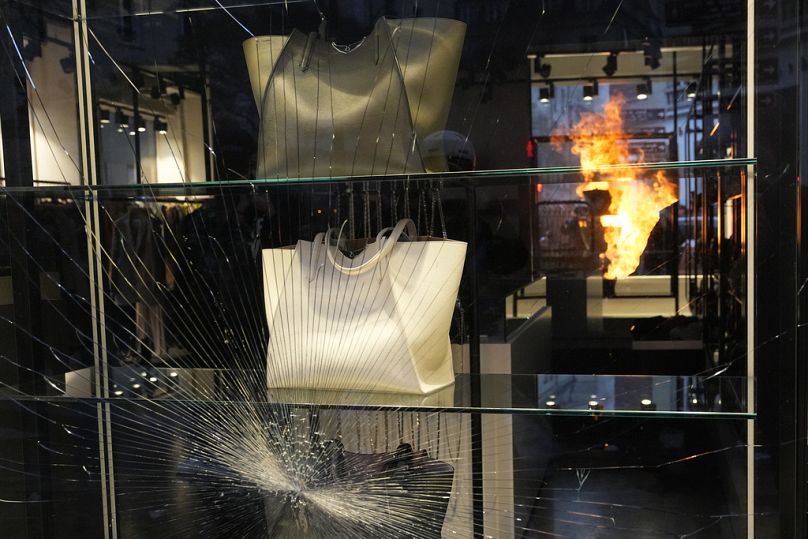French President Emmanuel Macron signed his controversial pension reform into law on Saturday after the Constitutional Council approved a plan to raise the retirement age from 62 to 64.
French President Emmanuel Macron is to address the nation on Monday after enacting his unpopular plans to raise the country's retirement age.
There were further demonstrations across the country on Saturday, with trade unions declaring the French President's action as "shameful" and "contemptuous" - a bitterness shared on the streets.
Macron promulgated his pension reform into law which includes raising the retirement age to 64 after the Constitutional Council on Friday approved the controversial plan despite months of mass protests that have damaged his leadership.
The Council's decision dismayed and enraged critics of the pension plan. Hundreds of union activists and others gathered peacefully in Paris Friday evening before some groups broke off in marches toward the historic Bastille plaza and beyond, setting fires to garbage bins and scooters as police fired tear gas or pushed them back.
There were also improvised demonstrations and riots in the cities of Marseille, Lyon, Nantes and Rennes, in the northwest of the country, where a police station was stormed and burnt down.
French unions called for a nationwide strike on May 1, which the CGT (General Confederation of Labour Union) Secretary-General said would be "massive" and "unprecedented".
"We call on all employees to put this date on their agenda and to come, with their colleagues, their neighbours, their families and their children. It will be festive; it will be important," she added.
Unions and Macron's political opponents vowed to maintain pressure on the government to withdraw the bill and activists threatened scattered new protests on Saturday.
Macron's office said he would enact the law in the coming days, and he has said he wants it implemented by the end of the year. Prime Minister Elisabeth Borne said Friday's decision “marks the end of the institutional and democratic path of this reform,” adding that there was “no victor" in what has turned into a nationwide standoff and France's worst social unrest in years.
The council rejected some measures in the pension bill, but the higher age was central to Macron’s plan and the target of protesters’ anger. The government argued that the reform is needed to keep the pension system afloat as the population ages; opponents proposed raising taxes on the wealthy or employers instead and said the changes threaten a hard-won social safety net.
In a separate but related decision, the council rejected a request by left-wing lawmakers to allow for a possible referendum on enshrining 62 as the maximum official retirement age. The council will rule on a second, similar request, next month.
Carl Pfeiffer, a 62-year-old retiree protesting outside City Hall, warned that the Constitutional Council’s decision won’t spell the end of tensions.
The council members “are irresponsible, because the anger that will come right after in the country, it’s their fault,″ he said.
Bartender Lena Cayo, 22, said she was disappointed but not surprised by the decision.
“We are protesting for so many weeks and the government didn’t hear us,” she said. "Workers who have gone on strike or protested the legislation since January are fighting “for their rights, but nothing changes.”
As tensions mounted hours before the decision, Macron invited labour unions to meet with him on Tuesday no matter what the Constitutional Council decision was, his office said. The unions rejected Macron’s invitation, noting that he had refused their previous offers of a meeting, and called for mass new protests on May 1, international workers’ rights day.
Unions have been the organisers of 12 nationwide protests since January and have a critical role in trying to tamp down excessive reactions by protesters. Violence by pockets of ultra-left radicals have marked the otherwise peaceful nationwide marches.
The plan to increase the retirement age was meant to be Macron's showcase measure in his second term.
The council decision caps months of tumultuous debates in parliament and fervour in the streets.
Spontaneous demonstrations were held around France ahead of the nine-member council's ruling. Opponents of the pension reform blockaded entry points into some cities, including Rouen in the west and Marseille in the south, slowing or stopping traffic.

